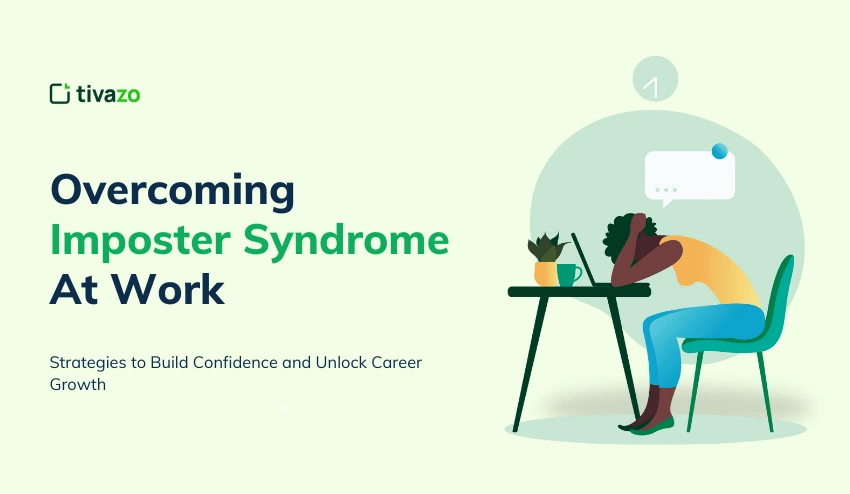Imposter Syndrome at Work is more common than you would think. Almost 70% of people experience this phenomenon at some point in their professional lives. Imposter syndrome at work can lead to loss of confidence and feelings of inadequacy, as well as fear of being “found out” as a fraud.
But you don’t have to go down that road. In this blog, we are going to talk about 5 proven strategies to help overcome imposter syndrome at work. These strategies will be useful, regardless of whether you just started at an organization or you have been a leader for years; what we’re providing here are tips that will help with confidence and your career path.
Key Highlights:
- What is Imposter Syndrome at Work
- 4 P’s of Imposter Syndrome
- How Do You Know If You Have Imposter Syndrome
- Proven Strategies to Overcome Imposter Syndrome at Work
- Imposter Syndrome in the Workplace
- Imposter Syndrome in High Achievers
- The Connection Between Imposter Syndrome and Burnout
What is Imposter Syndrome at Work?
Imposter Syndrome is the belief that you don’t deserve your success, even if the facts show otherwise. The people who suffer from this condition feel as though they are playing a part in a performance and that at some point they will be “found out.”
Symptoms of Imposter Syndrome at work:
- Self-doubt about your skills and accomplishments
- Fear of failure or success
- Burnout from working too much to keep from being “discovered”
- A perfectionist mentality and unwillingness to accept mistakes
What are the 4 P’s of Imposter Syndrome?
Imposter syndrome can show up in different ways for different people. Dr. Valerie Young, leading expert on imposter syndrome at work, has described four archetypes that demonstrate how people tend to experience imposter syndrome in a professional context:
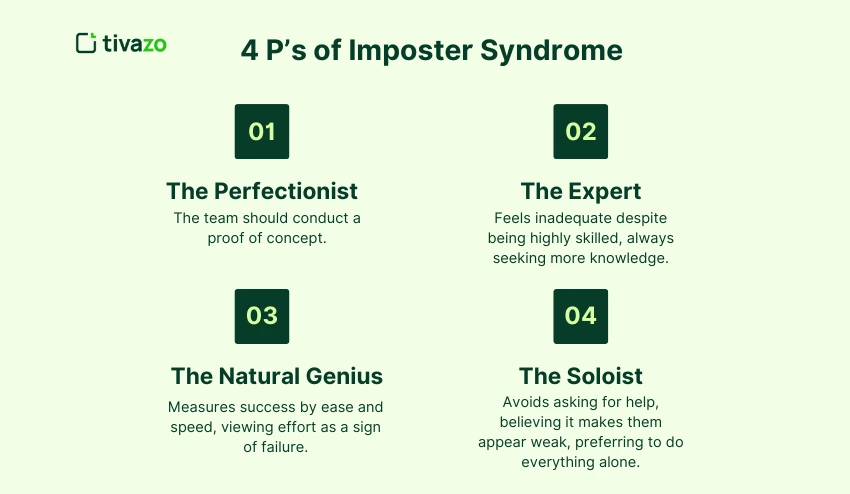
1. The Perfectionist
The perfectionist sets unrealistically high standards for themselves. They feel extreme disappointment when things don’t go perfectly, and feel that any mistake, no matter how small, is a total failure.
Example: An employee completes a project, but spends months reworking it for improvements, even if it was already quite good because it wasn’t perfect.
2. The Expert
The expert knows they are skilled and knowledgeable, but they want to learn more. They believe they do not know enough, which leads them to think little of their expertise.
Example: An experienced professional hesitates to guide meetings if they are unsure of something. They like to avoid being wrong or missing key information.
3. The Natural Genius
The natural genius measures success based on how effortlessly things come to them. If they need to work at something or it does not come naturally to them, they view it as a failure.
Example: A new learner, trying to acquire a new skill, believes they are incompetent if they have to spend time and effort to master the skill, as they did not pick it up instantly.
4. The Soloist
The soloist believes that asking for help is a sign of weakness. They feel more comfortable completing the task by themselves and so prefer to do everything by themselves, even if teamwork, collaboration, or co-contribution is important.
Example: An individual takes on every task by themselves in a situation where others could share the load to avoid appearing incompetent if they asked for help
How to Overcome the 4 P’s?
Creating strategies for each type, accepting imperfection, learning as a lifelong experience, and delegating responsibilities to others, you can start to differentiate which type of imposter syndrome at work you could relate to and start customizing each of your plans to work on your particular type.
How Do You Know If You Have Imposter Syndrome at work?
Identifying imposter syndrome at work is the first step to overcoming it. Sometimes, it’s welcomed and even celebrated as just a common phenomenon. But if you relate to any of the phrases below, you may be suffering from this at work:
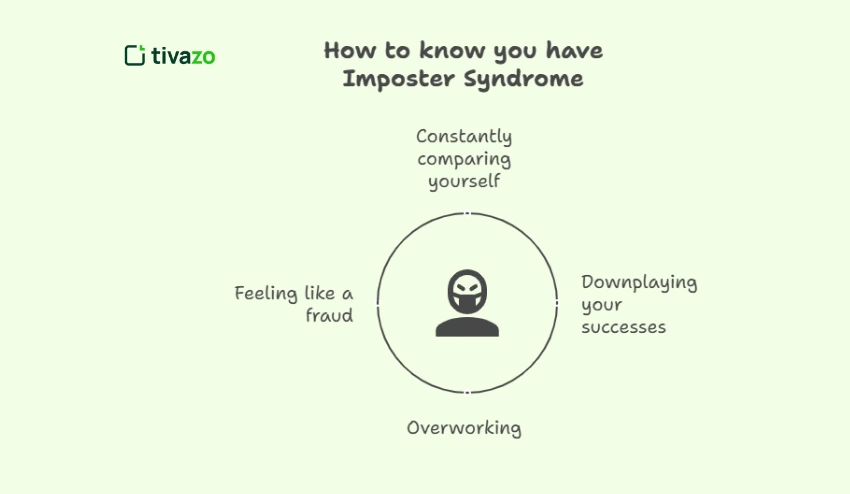
- Constantly comparing yourself to others and feeling not good enough
- Downplaying your successes, attributing them to external factors like luck
- Overworking than is required to try and prove you are worthy
- Feeling like a fraud, especially after receiving recognition for a major success or promotion
Quick Self-Assessment:
If you exhibited the above feelings regularly, then it is probable that you have experienced imposter syndrome ay work. The good news is that you are not alone, and there are practical things you can do to overcome it.
5 Proven Strategies to Overcome Imposter Syndrome at Work
Proven Strategies to Overcome Imposter Syndrome at Work are:
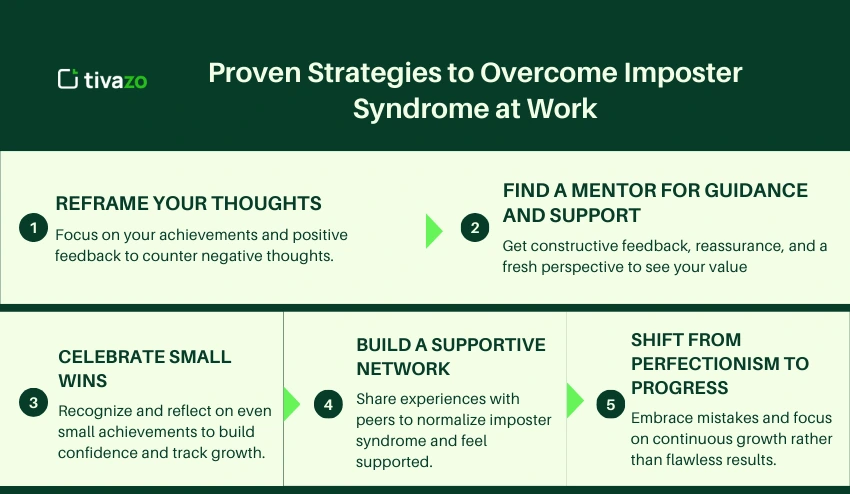
1. Reframe Your Thoughts: Focus on Facts, Not Feelings
Imposter syndrome at work is typically a result of negative self-talk. To interrupt this cycle, use facts, not feelings. When self-doubt creeps in, focus on your accomplishments and remember the positive feedback you’ve received to reinforce your self-belief.
- Focus on the facts: Think of a specific accomplishment or positive feedback you’ve received.
- Challenge negative thoughts: Instead of saying “I’m not good enough,” tell yourself, “I’ve done well in the past”.
- Remind yourself of past successes: Reflect on previous accomplishments to build confidence.
2. Find a Mentor for Guidance and Support
A mentor is one of the biggest assets to overcoming imposter syndrome at work because a mentor can provide constructive feedback and a new perspective. A mentor can help you see your value, validate your successes, provide more insights on how to continue improving, and guide you.
- Receive constructive feedback: Understand what you’re doing well and identify your growth areas.
- Get reassurance: Mentors help confirm where your abilities really are, and they can help reinforce your beliefs.
- Gain perspective: A mentor provides a new supportive perspective on your progress.
3. Celebrate Small Wins and Acknowledge Your Achievements
And tho we may try to minimize small victories, just like the Scottish moles, if you stop to celebrate those wins, it will build your mind and uplift your confidence. It will even out the not-enoughness and bring you up.
- Celebrate milestones: Recognize each accomplishment, big or small.
- Keep a record: Write down compliments, wins, achievements, victory moments, and general reasons why you want to be successful.
- Acknowledge growth: Every month, look back and reflect on your journey so far to see how much you have advanced as a reminder of progress.
4. Build a Supportive Network
Creating a network of trustworthy co-workers and peers provides you with a space where you are able to freely share your experience of being influenced by imposter syndrome at work. Meeting others with similar experiences who knew exactly how I felt was such validation and connection.
- Encourage open discussions: Normalize conversations about self-doubt.
- Support one another: Cheer and inspire one another, reflect on each other’s experiences.
- Leverage peer support: Recognizing that others may be feeling the same way can help counter the tendency to isolate yourself.
5. Shift from Perfectionism to Progress
Instead of concentrating on getting everything perfect, practice not being such a perfectionist and remind yourself that growth is possible so long as you are learning. Recognize imperfection is just another part of growing, and that it makes you stronger.
- Set realistic goals: Try to advance towards normal steps, not flawlessness
- Embrace mistakes: Acknowledgement of errors, that is the basic notion that every mistake allows you to learn and mature.
- Value progress over perfection: Progress is about growth, not perfection.
Imposter Syndrome at work and Leadership Roles
Even leaders are subject to imposter syndrome at work, particularly in high-stakes situations, as being “found out” is quite scary, and it can feel even more monumental in high-stakes situations. Understanding this is one thing, but doing something about it is another.
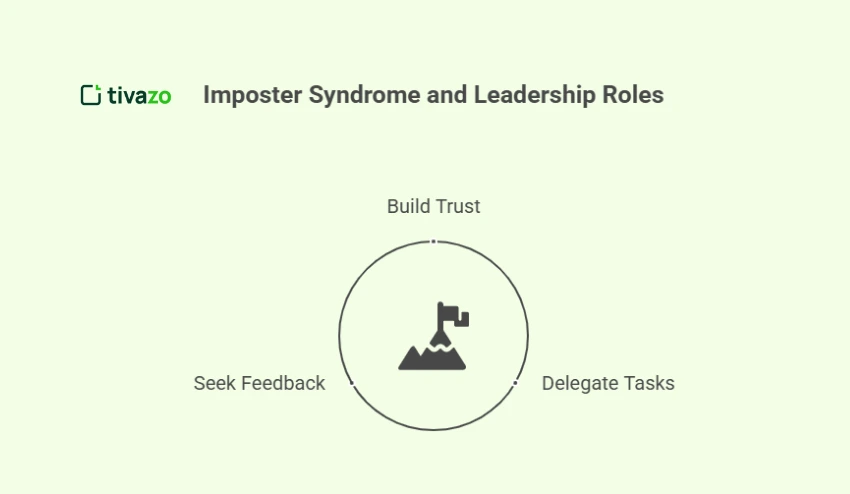
- Build trust: Promote an environment of open communication and vulnerability with your team..
- Delegate tasks: Share some of the burden to reduce the amount of stress you feel and solidify your role as a leader.
- Seek feedback: consistent feedback contributes to your development and can help assure that you are doing well.
How Managers Can Help Employees Overcome Imposter Syndrome At Work
Managers play an important role in the way employees see themselves and their worth in the workplace. Here are a few ways they can assist counters with imposter syndrome at work:
- Set clear expectations: Clarifying roles and goals ahead of time to ease uncertainty and self-doubt.
- Provide consistent feedback: Provide regular and consistent positive and corrective feedback to remind them of their worth.
- Foster a supportive environment: Provide a safe space for discussions that encourage workers to talk to you about their insecurities in an effort to assist them with support.
Signs of Imposter Syndrome in Professionals
Imposter Syndrome can impact anyone at all levels of experience and responsibility in the professional environment. Here are some common indicators that may mean you are struggling with it:
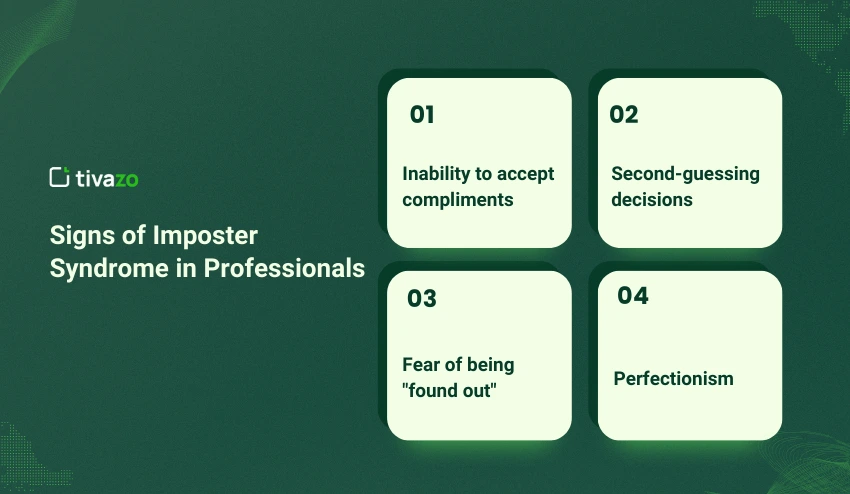
- Inability to accept compliments: You minimize your accomplishments and feel undeserving of praise.
- Second-guessing decisions: You constantly question your skills and abilities, feeling unsure or uncertain about your performance.
- Fear of being “found out”: You have a constant worry that someone is going to find out that you don’t measure up.
- Perfectionism: You set unrealistic goals as well as a fear of messing it up, so you push yourself into stress and feelings of burnout.
Imposter Syndrome in the Workplace: How It Affects Career Growth
Imposter syndrome can potentially cause great harm to career advancement through its effect on how professionals view themselves and their competence. It commonly causes many professionals to not advocate for themselves, making it difficult to ask for promotions, raises, or new opportunities because they feel they do not deserve them.
Imposter syndrome can also make employees feel alone, as they do not seek help from others because they fear being judged or exposed as a fraud, which can limit opportunities for collaboration or teamwork. The main things to understand to overcome these barriers are what imposter syndrome at work is and how it works, and focusing your efforts on rebuilding and developing your self-esteem and confidence so you can take control of your career path once again.
Imposter Syndrome in High Achievers: Why It Happens
High achievers are often perceived as the definition of success, but they can be the most vulnerable to imposter syndrome at work. Here’s why:
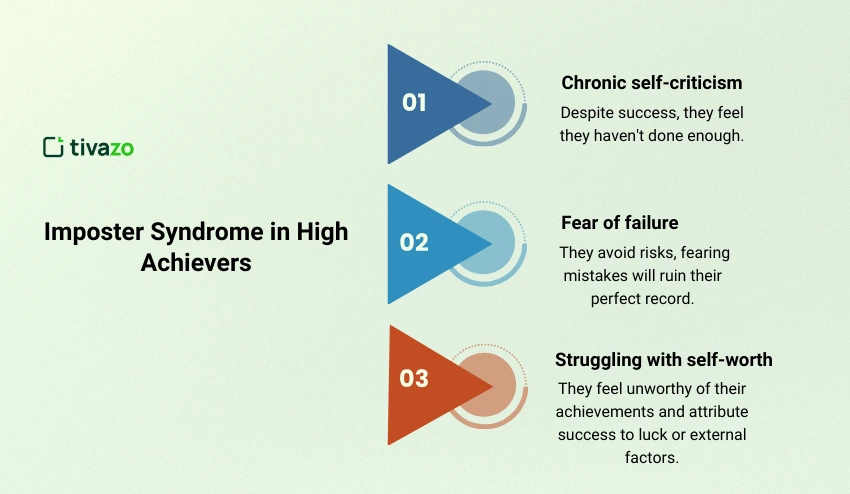
- Chronic self-criticism: They never feel like they have done enough, even when they have been successful.
- Fear of failure: They fear failure too much to take risks; there is too much pressure to be perfect all of the time.
- Struggling with self-worth: They feel undeserving of their success and attribute it to external factors.
The Connection Between Imposter Syndrome At Work and Burnout
Simply put, imposter syndrome can be worse than burnout. Overworking to avoid being seen as a fraud puts you in a continuous state of exhaustion, stress, and underperformance. If you feel like you may be burning out, it’s time to check your workload, seek help, and schedule breaks to disengage from ‘the grind’.
Imposter syndrome at work can be a major contributor to burnout. Here’s how:
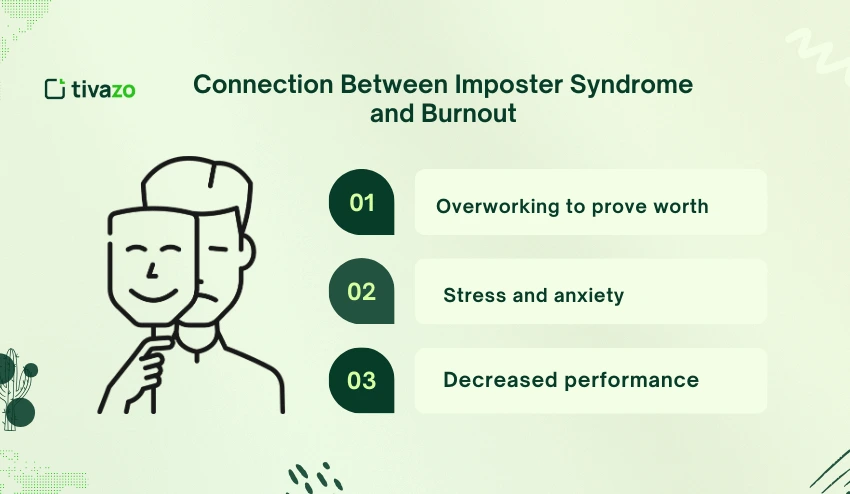
- Overworking to prove worth: Many people push themselves so hard to prove they belong that they reach a point of exhaustion.
- Stress and anxiety: The fear of being exposed causes constant mental strain.
- Decreased performance: Overworking often leads to decreased performance, which further amplifies feelings like a fraud.
Conclusion: Conquering Imposter Syndrome with Confidence
Imposter syndrome is a hurdle that many professionals face, but it doesn’t have to be the thing that defines your career. Identify the symptoms, use strategies, and find support to eliminate imposter syndrome from your life, and ultimately move ahead with confidence in the next step of your career.
Start today: Determine which strategies resonate with you and take the first steps toward unlearning the mindset you’re in. Over time, you’ll see for yourself how far you have come, and you’ll realize you have been and always will be worthy of every solo practitioner role and opportunity that comes your way.
